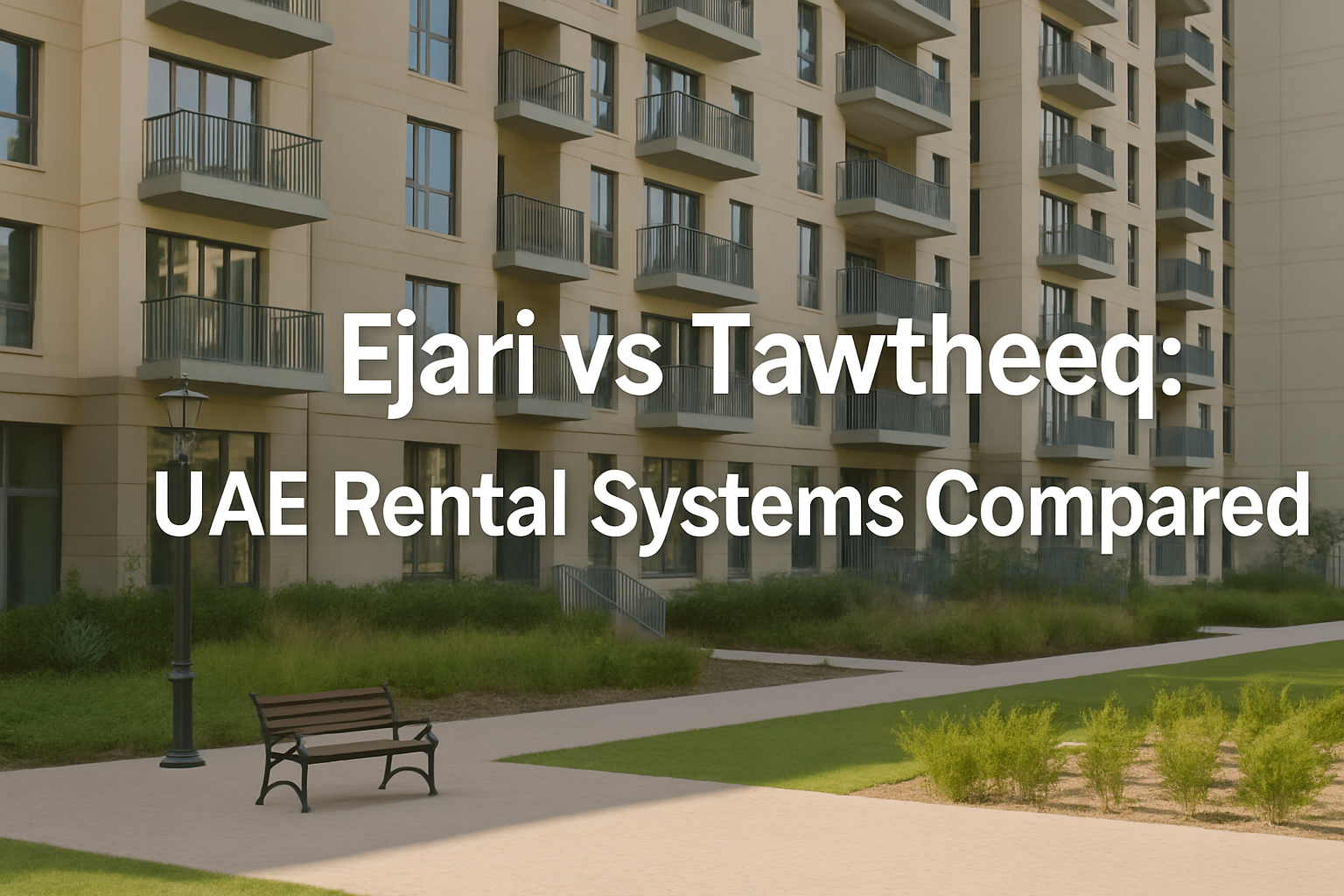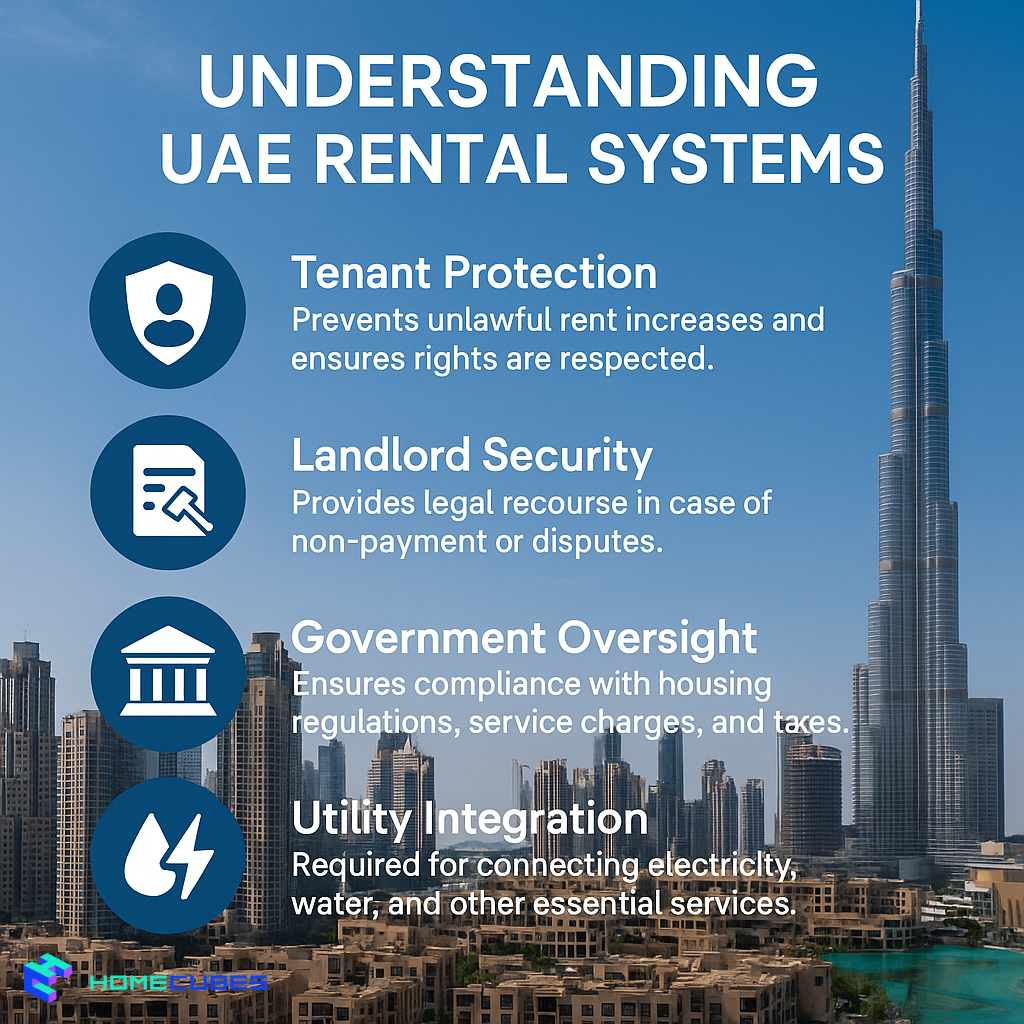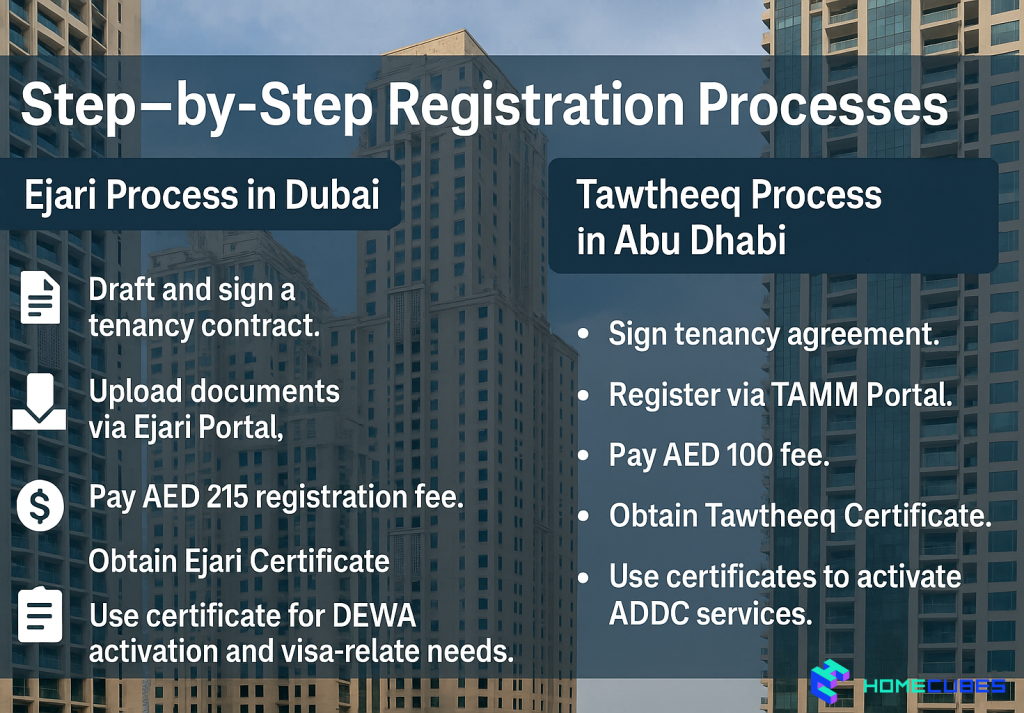

Table of Contents
- Introduction
- Understanding UAE Rental Systems
- What Is Ejari?
- What Is Tawtheeq?
- Key Differences Between Ejari and Tawtheeq
- Step-by-Step Registration Processes
- Ejari Process in Dubai
- Tawtheeq Process in Abu Dhabi
- Legal Framework and Regulations
- Fees and Charges Explained
- Case Study: Comparing Ejari and Tawtheeq for Investors
- Mistakes to Avoid
- Rental Systems Beyond Dubai and Abu Dhabi
- Future of Digital Rental Systems in the UAE
- FAQs
- Conclusion
- Partner with Homecubes
Introduction
Dubai and Abu Dhabi dominate the UAE’s rental property market, but each emirate enforces its own rules to regulate tenancy agreements. These rules revolve around two important rental systems: Ejari in Dubai and Tawtheeq in Abu Dhabi.
At first glance, they seem similar—both are mandatory tenancy registration systems. But their requirements, processes, fees, and regulatory implications differ. Whether you are a tenant signing your first rental contract, a landlord managing multiple units, or an investor diversifying across emirates, taking advantage of early investment in the Dubai real estate market, understanding these differences is crucial.
Why I chose Dubai out of 3 other Muslim countries:
Ultimately, it came down to 3 places: Saudi, UAE, and Egypt
Now, Egypt was better than I expected purely because its slowly headed in the right direction, especially New Cairo.
You can live in a villa there and spend no more… pic.twitter.com/7xRjsP60m3
— Shuayb (@Shuayb__) May 11, 2024
This guide provides a detailed comparison of Ejari and Tawtheeq, enriched with legal references, case studies, and practical advice.
Understanding UAE Rental Systems
Before comparing, to thrive as a Dubai investor in 2025, it’s important to understand why rental systems exist in the UAE.

- Tenant Protection – Prevents unlawful rent increases and ensures rights are respected.
- Landlord Security – Provides legal recourse in case of non-payment or disputes.
- Government Oversight – Ensures compliance with housing regulations, service charges, and taxes.
- Utility Integration – Required for connecting electricity, water, and other essential services.
Without registration, rental agreements are not legally enforceable in Dubai or Abu Dhabi.
What Is Ejari?
Ejari, meaning “my rent” in Arabic, is a Dubai Land Department (DLD) system launched in 2007. It is supervised by the Real Estate Regulatory Agency (RERA).
Functions of Ejari
- Registers all tenancy contracts in Dubai.
- Prevents double leasing or fraudulent agreements.
- Required for opening a DEWA (Dubai Electricity and Water Authority) account.
- Provides an Ejari Certificate, a mandatory document for visa renewals and business licensing (if linked to an office lease).
Documents Required
- Tenancy contract signed by both parties.
- Copy of Emirates ID and passport.
- Title deed or Oqood (if off-plan).
- DEWA premise number.
What Is Tawtheeq?
Tawtheeq is Abu Dhabi’s tenancy registration system introduced in 2011 by the Abu Dhabi Municipality (ADM).
Functions of Tawtheeq
- Registers all tenancy contracts within Abu Dhabi city and surrounding municipalities.
- Centralized database that integrates with ADDC (Abu Dhabi Distribution Company) and ADHA (Abu Dhabi Housing Authority).
- Provides a Tawtheeq Certificate, mandatory for ADDC account activation.
Documents Required
- Tenancy agreement.
- Emirates ID and passport.
- Property ownership certificate.
- ADDC account details.
Key Differences Between Ejari and Tawtheeq
| Feature | Ejari (Dubai) | Tawtheeq (Abu Dhabi) |
| Authority | Dubai Land Department (DLD) | Abu Dhabi Municipality (ADM) |
| Supervision | RERA | Department of Municipalities |
| Platform | DLD Ejari Portal | TAMM Digital Platform |
| Integration | DEWA | ADDC, ADHA |
| Legal Basis | Law No. 26 of 2007 (Tenancy Law) | Law No. 20 of 2006 |
| Processing Time | 1–2 business days | Same day to 2 days |
| Registration Fee | AED 215 | AED 100 |
| Penalty for Delay | From AED 10,000 | From AED 20,000 |
Step-by-Step Registration Processes

Ejari Process in Dubai
- Draft and sign a tenancy contract.
- Upload documents via Ejari Portal.
- Pay AED 215 registration fee.
- Obtain Ejari Certificate.
- Use certificate for DEWA activation and visa-related needs.
Tawtheeq Process in Abu Dhabi
- Sign tenancy agreement.
- Register via TAMM Portal.
- Pay AED 100 fee.
- Obtain Tawtheeq Certificate.
- Use certificates to activate ADDC services.
Legal Framework and Regulations
Dubai (Ejari)
- Governed by Law No. 26 of 2007 and amendments under Law No. 33 of 2008.
- Rent increases are regulated by RERA’s Rental Index.
- Disputes resolved via Dubai Rental Dispute Center.
Abu Dhabi (Tawtheeq)
- Governed by Law No. 20 of 2006 on Leasing of Real Estate.
- Eviction and termination rules are stricter in Abu Dhabi compared to Dubai.
- Disputes handled by Abu Dhabi Judicial Department.
Fees and Charges Explained
| Transaction Type | Ejari (Dubai) | Tawtheeq (Abu Dhabi) |
| Registration | AED 215 | AED 100 |
| Renewal | AED 215 | AED 100 |
| Amendment | AED 50 | AED 50 |
| Cancellation | AED 30 | AED 50 |
Case Study: Comparing Ejari and Tawtheeq for Investors
Investor Profile:
Ali owns two rental units—one in Dubai Marina and another in Al Reem Island, Abu Dhabi.
- For Dubai Marina, Ejari ensures DEWA connection, protects rental income, and provides smooth legal enforcement in case of disputes.
- For Al Reem Island, Tawtheeq centralizes registration, integrates with ADDC, and enables Ali to benefit from ADHA housing programs.
Conclusion:
Investors with multi-emirate portfolios must master both systems to remain compliant.
Mistakes to Avoid
- Late Registration → Results in heavy fines.
- Incorrect Contract Details → Leads to rejections.
- Ignoring Renewals → Utilities may be disconnected.
- Using Agents Without Authorization → Risk of fraud and invalid registration.
Rental Systems Beyond Dubai and Abu Dhabi
While Ejari and Tawtheeq dominate, other emirates have their own rental systems:
- Sharjah: No centralized Ejari-like platform, but tenancy contracts are attested at the Municipality.
- Ajman: Uses the Tasdeeq system for rental registration.
- Ras Al Khaimah & Fujairah: Municipality-driven manual systems.
This fragmentation highlights the UAE’s emirate-specific rental governance model.
Future of Digital Rental Systems in the UAE
The UAE is moving toward unified, blockchain-based rental systems. Dubai’s DLD has already experimented with blockchain in Ejari Smart Contracts, while Abu Dhabi’s TAMM platform integrates multiple e-services.
Predictions for the future:
- Unified rental system across all emirates.
- Blockchain integration for transparency.
- Automated smart contracts linked to DEWA/ADDC.
- AI-driven rental dispute resolution.
FAQs
- Are Ejari and Tawtheeq interchangeable?
No. Ejari applies to Dubai properties; Tawtheeq applies to Abu Dhabi properties. - Can tenants refuse to register?
No. Registration is mandatory under law. - Do landlords pay the registration fees?
Usually yes, but this can be negotiated in the contract. - How are disputes handled?
- Dubai → Rental Dispute Center.
- Abu Dhabi → Judicial Department.
- Are digital contracts legally valid?
Yes. Both Ejari and Tawtheeq accept fully digital submissions. - What happens if my tenancy is not registered?
Utilities cannot be connected, and the contract will not be enforceable in court.
Conclusion
Both Ejari and Tawtheeq are essential rental systems that provide transparency, legal protection, and government oversight. While their objectives align, their procedures, fees, and legal implications differ.
For tenants, landlords, and investors, compliance is non-negotiable. Understanding the nuances ensures smoother leasing, fewer disputes, and better investment outcomes.
Partner with Homecubes
At Homecubes, we are committed to helping investors and tenants navigate the UAE’s complex rental and ownership systems. While our real estate tokenization platform is currently pending VARA licensing, our expertise ensures you remain ahead of every regulatory shift in the property market.
👉 Contact Homecubes today to learn how you can benefit from smarter, compliant real estate investments in the UAE.










